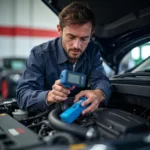Finding the right research services cars scheme can be a challenge. Whether you’re looking for vehicles for crash testing, emissions research, or autonomous driving development, understanding how to contact the right providers and navigate the acquisition process is crucial. This article provides a comprehensive guide to contacting providers and successfully acquiring the vehicles you need for your research.
Understanding Research Services Cars Schemes
Research services car schemes provide access to vehicles specifically for research and development purposes. These schemes can involve purchasing, leasing, or borrowing vehicles depending on the specific needs of the research project. They can encompass a wide range of vehicle types, from standard production models to specially modified vehicles equipped with data acquisition systems and other research-specific hardware.
Different Types of Research Vehicles
Different research areas require different types of vehicles. Understanding these categories can help you refine your search and contact the appropriate providers.
Crash Test Vehicles
These vehicles are designed for controlled crash testing to evaluate safety features and structural integrity. They often require specific modifications and instrumentation to collect data during impact.
Emissions Research Vehicles
Vehicles used in emissions research are equipped with advanced sensors to monitor and analyze exhaust gases, helping researchers develop cleaner and more efficient engines.
Autonomous Driving Research Vehicles
These vehicles are outfitted with a suite of sensors, computers, and software for developing and testing self-driving technologies. They often require specific modifications to accommodate these complex systems.
How to Contact for Acquisition of Research Services Cars Scheme
Successfully acquiring research vehicles requires a strategic approach. Here’s a step-by-step guide:
-
Define Your Research Needs: Clearly outline the specific requirements of your research project, including the type of vehicle, necessary modifications, and data acquisition needs.
-
Identify Potential Providers: Research and identify companies or organizations that offer research services cars schemes. This may involve contacting vehicle manufacturers, specialized research institutions, or automotive testing facilities.
-
Prepare a Detailed Proposal: Outline your research project, budget, and desired vehicle specifications. This proposal will serve as the basis for your communication with potential providers.
-
Initial Contact: Reach out to potential providers via email or phone to express your interest and request information about their research services car schemes.
-
Negotiate Terms and Conditions: Once you’ve identified a suitable provider, carefully negotiate the terms and conditions of the agreement, including cost, delivery timelines, and any necessary modifications or instrumentation.
Key Considerations When Contacting Providers
-
Data Acquisition Capabilities: Ensure the provider can offer vehicles equipped with the necessary data acquisition systems for your research.
-
Vehicle Modifications: Confirm if the provider can accommodate any required vehicle modifications, such as installing specialized sensors or altering the vehicle’s structure.
-
Cost and Budget: Carefully consider the overall cost of acquiring and maintaining the research vehicles within your budget constraints.
Frequently Asked Questions (FAQs)
-
What types of vehicles are typically available through research services car schemes? A wide range of vehicles, from standard production models to heavily modified research-specific vehicles, can be available.
-
How do I find reputable providers of research services car schemes? Research online, contact vehicle manufacturers, or inquire with automotive testing facilities and research institutions.
-
What information should I include in my proposal to a potential provider? Clearly outline your research project, budget, desired vehicle specifications, and data acquisition needs.
-
What are the typical costs associated with acquiring research vehicles? Costs can vary significantly depending on the type of vehicle, necessary modifications, and the duration of the research project.
-
Can I lease research vehicles instead of purchasing them? Yes, leasing is often an option depending on the provider and the specific research needs.
-
What are the key considerations for choosing a provider? Consider their data acquisition capabilities, ability to accommodate vehicle modifications, cost, and overall reputation.
-
How do I ensure the research vehicles meet my specific requirements? Clearly communicate your needs in your proposal and carefully negotiate the terms and conditions with the provider.
Finding the Right Research Vehicle Partner
Choosing the right partner for your research vehicle needs is crucial for the success of your project. By following the steps outlined in this article and carefully considering the key factors, you can successfully contact providers and acquire the vehicles that meet your specific research requirements. Remember to clearly define your needs, conduct thorough research, and negotiate favorable terms to ensure a smooth and productive research process. Contact For Acquisition Of Research Services Cars Scheme today and get your project moving forward.
 Contacting a Research Service Provider
Contacting a Research Service Provider
Further Questions and Resources
-
What are the latest advancements in crash testing technology? Explore articles on CarServiceRemote about the latest crash test dummies and sensor technology.
-
How can I optimize my research vehicle data acquisition process? Read our guide on data logging and analysis for research vehicles.
Need help finding the perfect research vehicle for your project? Contact our expert team via WhatsApp: +1(641)206-8880 or email us at [email protected]. We’re available 24/7 to assist you.

